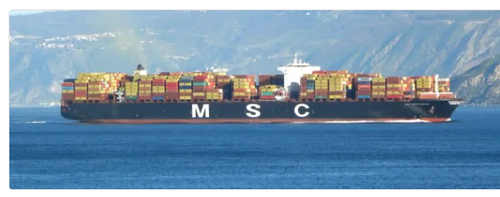The tax for emissions from ships will be paid by cargo owners
 Cargo owners on the Europe-Greece/Turkey route will have to pay up to $500 for a refrigerated container after the entry into force of the Greenhouse Gas Emissions Trading System in the EU countries (Emissions Trading System, ETS). This is reported by SeaNews with reference to Seatrade Maritime. "Although the details of the system itself still need to be settled, the MSC shipping company stated that compliance with the ETS requirements will lead to higher operating costs – the carrier will shift them to customers. The costs associated with this will depend on the cost of EU permits – EU Allowances (EUA) for CO2 emissions above the established threshold," the newspaper writes.
Cargo owners on the Europe-Greece/Turkey route will have to pay up to $500 for a refrigerated container after the entry into force of the Greenhouse Gas Emissions Trading System in the EU countries (Emissions Trading System, ETS). This is reported by SeaNews with reference to Seatrade Maritime. "Although the details of the system itself still need to be settled, the MSC shipping company stated that compliance with the ETS requirements will lead to higher operating costs – the carrier will shift them to customers. The costs associated with this will depend on the cost of EU permits – EU Allowances (EUA) for CO2 emissions above the established threshold," the newspaper writes.
MSC will calculate the additional fee monthly with reference to the publicly available EUA cost Index for export and import cargo.
"The additional fee for compliance with the requirements of the Emissions Trading System, calculated on the basis of the EUA cost of 90 euros per ton and provided that flights are covered by the scheme by 100%, will range from $32 for a dry container on the route from the USA or Canada to the EU countries to $500 for a refrigerated container – from North or South Europe to Greece/Turkey. MSC said the industry expects either a phased implementation of ETS over four years from 2023, or a full implementation of the system from January 2023. The final date has not yet been determined, as the legislative process is still ongoing," Seatrade Maritime writes.
Recall that in June of this year, the European Parliament voted to extend the System of trading quotas for greenhouse gas emissions in the EU countries to shipping. Shipping companies will have to buy quotas for all greenhouse gas emissions for ships with a gross tonnage of over 5,000 tons entering EU ports on intra-European routes, regardless of the flag, and for 50% of emissions on flights starting or ending outside the EU, as well as all emissions while ships are moored in EU ports. Previously, it was assumed that this system would start operating from January 1, 2024.
Earlier, Maersk predicted that the additional fee for each refueling container on the Asia-Europe route would be $255.
It should be noted that in the summer of 2021, MSC entered the top ten companies – the main environmental pollutants in Europe. Then, according to Transport & Environment, the volume of emissions from MSC vessels involved on European routes amounted to 10.9 million tons. MSC was followed by Maersk (6.5 million tons of CO2) and CMA CGM (5 million tons of CO2). Between 65% and 79% of emissions were from flights between European and non-European ports.
The Russian Seafarers' Union believes that if compliance with the ETS requirements leads to higher operating costs, then shipowners should ensure that this does not affect the crews under any circumstances. After all, it is no secret that when it comes to the growth of operating costs, it is not uncommon for the optimization of the seafarers' remuneration fund and ship maintenance to begin first, which necessarily negatively affects safety.
Source: http://www.sur.ru/ru/news/lent/2022-11-11/nalog_za_vybrosy_s_sudov_zaplatjat_gruzovladelcy_21817/







